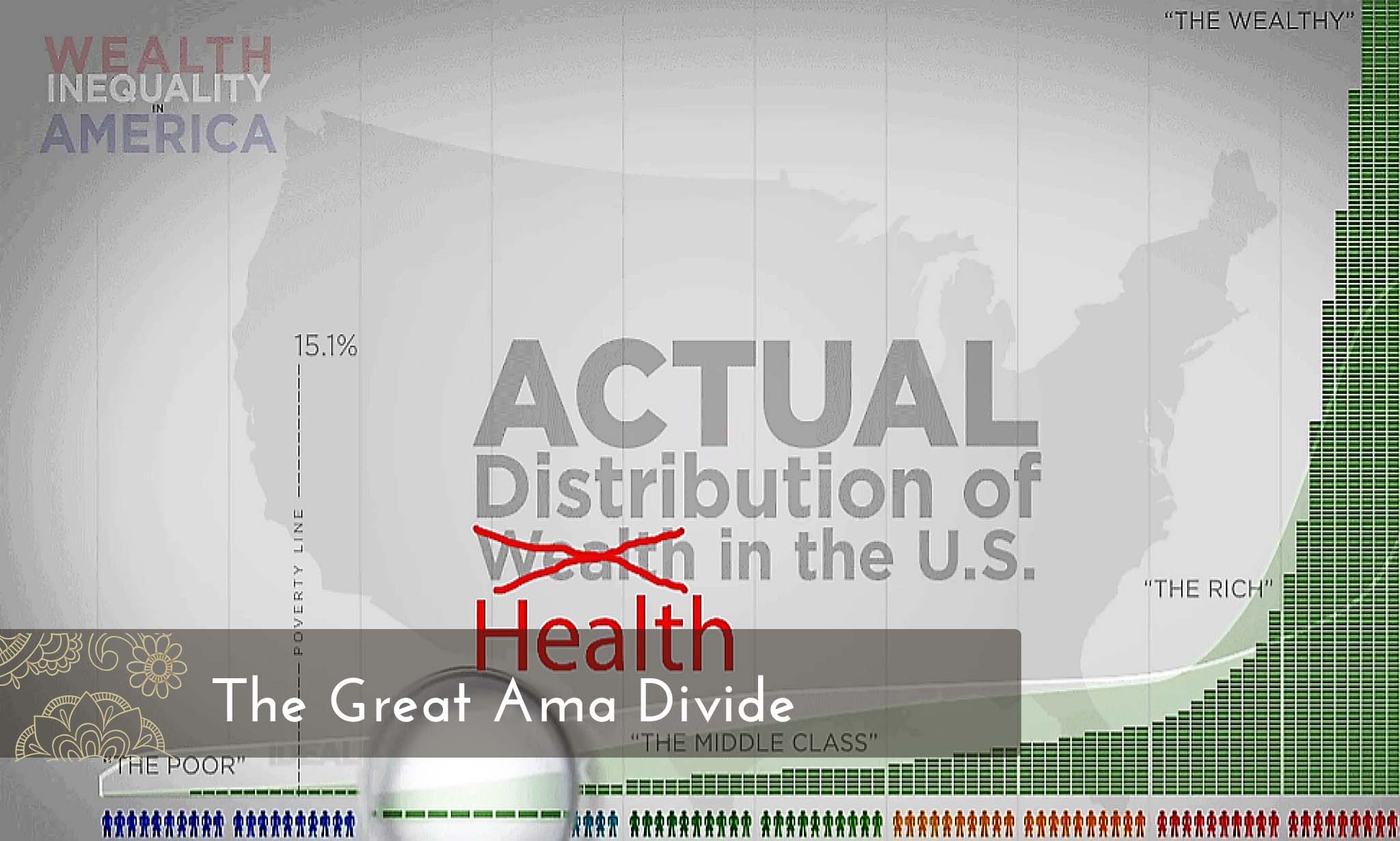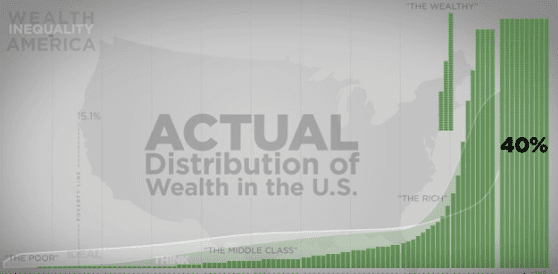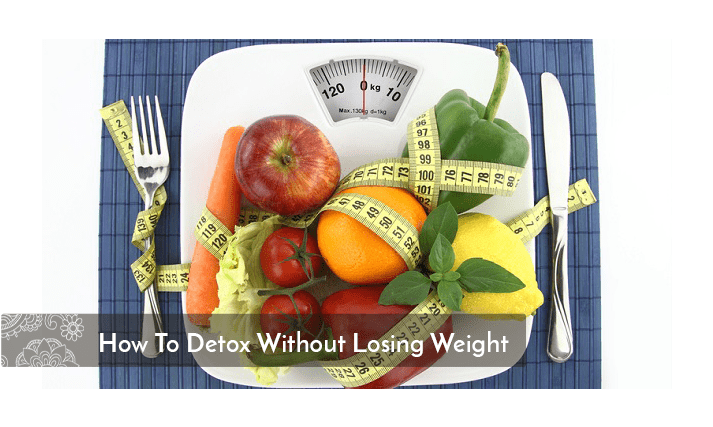The Great Ama Divide

You hear a lot about the great income divide, or Economic Divide — meaning economic inequality. (Here’s an image and link to show you how it’s going down in the U.S.)

But what about The Great Ama Divide?
I don’t hear about that.
But I see The Great Ama Divide everywhere. I’m not looking for it. I just see it. The yogis and vaidyas of the world see it too. I made a short video on what I’m talking about.
My guess is that the numbers are pretty similar to those of the Economic Divide.
We’ve been over what ama is again and again, but here’s the list if you’re new around here. (You can also click here for the Agni + Ama Checklist.)
You have ama if you have these symptoms:
- Fatigue
- A spare tire
- Overall heaviness
- A coating on your tongue
- Stiff joints upon arising
- A hard time making decisions or thinking clearly
- Indigestion, constipation, bloating, and heartburn
- Snot
- Cravings for crap
- PMS, fibrocystic breasts, and hard periods
- Cellulite
- Blood sugar spikes and crashes
- Moods that control your diet
The Great Ama Divide
The problem with ama is that it makes us stupid.
Take a minute to think about this. The stakes are high.
Ama blocks the flow of consciousness. Consciousness has two key components:
- Energy (prana)
- Intelligence (vidya)
Intelligence enables us to learn from yesterday. Prana (wind) literally moves the intelligence into our cells, giving us inspiration and desire for action. Ama gets in the way of this all going down.
Do you see the problem here? If we block the flow, we get dumbed down, depressed, and complacent. It’s a recipe for the slow disaster of degeneration.
Did your grandparents have ama?
Two of mine did, and two of mine didn’t. None of my great-grandparents had ama. Chances are, it’s the same for you. Ama isn’t new to the human species, but with processed food, hyperstimulation, excess food availability, and eating more calories later in the day, we’ve become a freakshow of a species due to ama.
Right? We’re becoming a freakshow. Look at the old-time photos. Those folks are lean, lithe, hardworking peeps. They ate two or three times a day. Snacks and supplements were not on the menu. Real food was the only option, and it wasn’t usually wasted inside or outside of the body.
But, times have changed. More than two-thirds (68.8%) of adults are considered overweight or obese. More than one-third (35.7%) of adults are considered obese. More than 1 in 20 (6.3%) have extreme obesity. Almost 3 in 4 men (74%) are considered overweight or obese. Blech.
Wealth vs. Health
The weird and super-groovy thing about The Great Ama Divide is this: you don’t have to be rich to have a divine inner-body experience. That’s right. If you decide to go ama-free, you’ll save tens of thousands of dollars over the course of your life.
If you haven’t figured this out yet, you definitely have ama. Remember how I said ama makes you stupid because it blocks the flow of intelligence? This is one crucial factor that makes ama such an expensive habit.
That’s right. Ama is a habit. Ama is a poor choice because it makes you dumb. Ama also makes you unattractive.
The True Cost of Ama
- Retail therapy
Researchers Selin Atalay and Margaret Meloy found that 62% of shoppers had purchased something to cheer themselves up, and another 28% had made a purchase as a form of celebration.
- Pharmaceutical drugs and surgeries
Per capita national health expenditures in the U.S. are $9,523 (2014). - The opportunity cost of feeling average vs. feeling awesome
(You can come up with your own number for this based on the way you value how you feel). - Supplements
Among those who had an expenditure on complementary approaches, the mean out-of-pocket spending per person was $510. - Bodywork and holistic therapies
Americans spent $14.7 billion out of pocket for visits to complementary practitioners. This is almost 30% of what they spent out of pocket on services from conventional physicians ($49.6 billion). They spent more on visits to complementary practitioners than on natural product supplements or self-care purchases, and the mean annual out-of-pocket expenditure for practitioner visits was $433. - Income plateau
Most Americans will end up at 55 where they were at 35 — not in vigor or short-term memory, sadly, but in earnings. I talk about this more in the Ama + Dharma video I shot a few years ago. - Frequent eating out
The percentage of food dollars spent on dining out has increased from 34% in 1974 to 50% in 2014. - Food waste
Food waste is a serious problem in the U.S., with the average family tossing $640 worth of food in the trash every year.
Ama is expensive for our planet. Ama is expensive for you. Ama is a bad investment — no matter how you cut it.
I used to think ama wasn’t affecting me…
And I was wrong. When I look at the list above, I see the money I spent on supplements and holistic therapies. I see my scaled-down version of retail therapy. The real cost to me, though, was #3. My income never plateaued, but I attribute that more to my tireless pursuit of entrepreneurship. Plenty of entrepreneurs have ama. Consider one of my favorite entrepreneurial friends: her business grossed $4 million last year, and she carries 30 pounds of ama around with her each and every day with every breath.
For me, it was less dramatic. Now that I’m scraping the bottom of my ama barrel, I see clearly. I see the cost, the expense of ama on my spirit. On my joy. On my love. On my transparency. I do weep for what the past 30 years of my adult life could’ve been if my future self could’ve shaken my maiden self to my core and shown me my light.
Squelching Your Inner Light
Simply put, ama blocks the flow of our inherent inner joy (ananda). The more awake you are to an assumption or an experience that you are indeed light and matter, the more un-clarity there is in the energetics of what or how you’re eating — the more cloudiness there is in your emotional being.
Like Rihanna says, “You want to groove? I’ma show you how to move.” Transform your ama into illumination.
















Glo Alvarez
Posted at 00:40h, 15 MarchGreat video. Thank u
Rhonda Kuster
Posted at 05:00h, 13 MarchI tried to register and none of the links worked for me
Jelena
Posted at 12:19h, 25 AprilHello Rhonda, can you tell us which links don’t work?